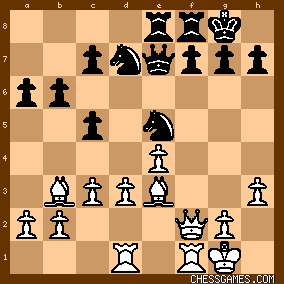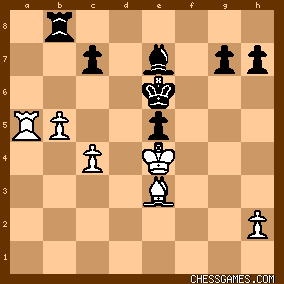|
Introduction
This match of six games up took place between Alexander Alekhine (28)
and Richard Teichmann (52) in Berlin from 4th to 10th June 1921. The players were newly arrived in the German capital, both having endured privation during the First World War and its aftermath. They had met three times previously; each had won one game and one being drawn. On this occasion, Alekhine seemed to be running away with the match. By Game 4, he was two games up. Teichmann then rallied and, recovering his old strength, he managed to tie the match. The decisive games are of high quality. The organisation of the match The match was arranged and financed by Bernhard Kagan, who also arranged further matches involving Alekhine in Berlin. (1) Kagan played an important role in ingeniously maintaining master chess in Berlin despite the grave economic dislocations of the war. In September 1918 he had organised the exceptionally strong Berlin Grandmasters (1918) tournament in the Cafe Kerkau, whose first prize consisted of 1,000 cigarettes rather than the depreciating paper currency. In December 1920, he organised the Berlin (1920) tournament, which brought Gyula Breyer the greatest success of his life. Alekhine
During 1919-1921, Alekhine had little opportunity to play master chess in Russia. His homeland had been wracked by political revolution, civil war and then, in 1921, a catastrophic drought and famine. In those dystopic times, Alekhine managed to secure an interpreting job. This at least fed him whilst his victories in several small matches, the 1919-1920 Moscow City Chess championship and then the All-Russia Chess Olympiad in October 1920 brought him very little material reward. Alekhine's final chess engagement in Russia would be to win a match against the Moscow champion Nikolay Grigoriev in early March 1921 (+2 =4 -0). Three months later, he was in Berlin and at odds with the Soviet authorities. On March 15th, 1921, Alekhine had married the Swiss communist and journalist Annaliese Rüegg. "Because Anneliese Rüegg had excellent connections to the Bolshevist leaders she and her husband were allowed to leave Russia." (2) In June 1921, Alekhine abandoned Rüegg in Paris and went to Berlin. Teichmann
In July 1914, after the outbreak of the First World War, Teichmann travelled to Lucerne in Switzerland. His lengthy stay in England may have made him apprehensive of internment in Germany. In fact, this did not begin until early 1915 and was restricted to the imprisonment of British and French male residents. Teichmann would live in Switzerland from 1914 to 1921. His existence was threadbare and miserable. The absence of any international chess tournaments left him barely making a living. He survived by hustling in cafes, giving exhibitions (3) and reluctantly writing a weekly column for a newspaper. Living in Switzerland did not shield him from all the doleful effects of the war. During the war, Switzerland was blockaded by the Allies, leading to shortages. At the same time, inflation took off as the government printed money to finance its defence spending. (4) In 1918, there were food shortages and a nationwide general strike. Teichmann had played little chess after June 1914, when he had won two exhibition games against Frank Marshall (+0 =1 -1). (5) There were very few Swiss chess opportunities; even the national championship lapsed from 1915 to 1920. Whilst in Switzerland, he only played one event with a master strength player, Hans Fahrni. This took place in Zurich in 1917 and Teichmann won by 3 to 1. (6) On 25th May 1921, Teichmann returned to Berlin. He had probably been encouraged by Bernhard Kagan, who arranged this match and Teichmann was soon to be a contributor to Kagan's Neueste Schachnachrichten (Kagan's Latest Chess News). (7) The progress of the match 1 2 3 4 5 6
Alekhine ½ 1 ½ 1 0 0 3
Teichmann ½ 0 ½ 0 1 1 3
Progressive scores: 1 2 3 4 5 6
Alekhine ½ 1½ 2 3 3 3
Teichmann ½ ½ 1 1 2 3
Teichmann had White in the odd-numbered games.
The games
Game 1. A draw in only sixteen moves, Teichmann making no apparent effort to play for a win as White. Game 2. Alekhine opened with the Vienna, which transposed into a King's Gambit Declined. He played accurately to build up a Kingside attack. Teichmann without making any obvious mistake was pressed back and Alekhine in his notes to the game stated after move 17 for White, 
click for larger view"Preparing 18.d4, against which there is no defence. The loss of the present game by Black can be attributed to the fact that his Knights lack bases in the centre, and that in positions of this character the possession of the two Bishops constitutes a decisive advantage for the opponent ... Black will find himself reduced to absolute passivity." (8) Game 3. Teichmann was unable to gain any advantage from the opening, and the game soon petered out. So far, Teichmann had failed to put Alekhine under any pressure. Game 4. This was another impressive game by Alekhine. Teichmann defended with the Open Variation of the Ruy Lopez. 
click for larger viewDespite a lack of material in the late endgame, Alekhine managed to push his <b> and <c> pawns forward fatally cramping Black. Alekhine chose Game 2 and this game for his My Best Games of Chess 1908 -1923. (9) Game 5. Two games down with only two to play, yet Teichmann did not break. Facing the same defence as in Game 3 he was more forceful, quickly castling Queenside and building an attack. Alekhine's king was stranded in the centre and in an unfavourable position, he blundered losing a piece to a pin against his Queen. Game 6. Alekhine was still a game ahead in the match. He appears to have decided to play carefully perhaps because his older opponent was not tiring but was playing better. Alekhine as White chose the Exchange Variation of the Ruy Lopez, with which over the previous few years he had been successful. Teichmann was significantly stronger than Alekhine's previous Russian opponents in this line and Alekhine was strategically outplayed. 
click for larger viewThe advance of the <f> pawn won Teichmann the game and levelled the match at two wins each. After the conclusion of the match, both players tested out an experimental defence <1. e4 e6 2. d4 d6>. Alekhine drew as White and then won the second game with Black.
Notes
(1) Michael Negele, https://www.schachbund.de/news/genu....
(2) André Schulz, https://en.chessbase.com/post/remem....
(3) Dmitry Gorodin, https://e3e5.com/article.php?id=1730.
(4) Britannica, https://www.britannica.com/place/Sw....
(5) Gino Di Felice, Chess Results, 1901-1920, page 219.
(6) Gino Di Felice, Chess Results, 1901-1920, page 242.
(7) Michael Negele, https://www.schachbund.de/news/genu....
(8) Alekhine, My Best Games of Chess 1908 -1923, Game 90, pages 239-241. Dover.
(9) Alekhine, My Best Games of Chess 1908 -1923, Game 91, pages 241-243. Dover. User: MissScarlett - original collection. User: Chessical - text.
| 



![]()
